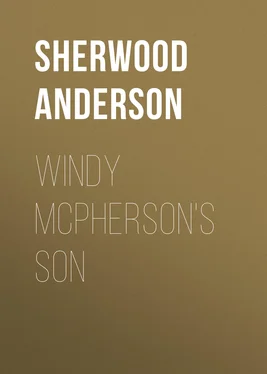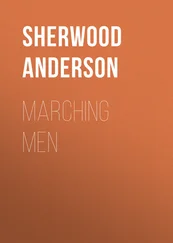Sherwood Anderson - Windy McPherson's Son
Здесь есть возможность читать онлайн «Sherwood Anderson - Windy McPherson's Son» — ознакомительный отрывок электронной книги совершенно бесплатно, а после прочтения отрывка купить полную версию. В некоторых случаях можно слушать аудио, скачать через торрент в формате fb2 и присутствует краткое содержание. Издательство: Иностранный паблик, Жанр: foreign_prose, literature_20, foreign_antique, на английском языке. Описание произведения, (предисловие) а так же отзывы посетителей доступны на портале библиотеки ЛибКат.
- Название:Windy McPherson's Son
- Автор:
- Издательство:Иностранный паблик
- Жанр:
- Год:неизвестен
- ISBN:нет данных
- Рейтинг книги:5 / 5. Голосов: 1
-
Избранное:Добавить в избранное
- Отзывы:
-
Ваша оценка:
- 100
- 1
- 2
- 3
- 4
- 5
Windy McPherson's Son: краткое содержание, описание и аннотация
Предлагаем к чтению аннотацию, описание, краткое содержание или предисловие (зависит от того, что написал сам автор книги «Windy McPherson's Son»). Если вы не нашли необходимую информацию о книге — напишите в комментариях, мы постараемся отыскать её.
Windy McPherson's Son — читать онлайн ознакомительный отрывок
Ниже представлен текст книги, разбитый по страницам. Система сохранения места последней прочитанной страницы, позволяет с удобством читать онлайн бесплатно книгу «Windy McPherson's Son», без необходимости каждый раз заново искать на чём Вы остановились. Поставьте закладку, и сможете в любой момент перейти на страницу, на которой закончили чтение.
Интервал:
Закладка:
Sam’s mind that had been inflamed by the kiss of the girl cooled in the presence of Telfer. In the summer madness of the talking man there was something soothing to the fever in his blood. He followed the words eagerly, seeing pictures, getting thrills, filled with happiness.
At the edge of town a buggy passed the walking pair. In the buggy sat a young farmer, his arm about the waist of a girl, her head upon his shoulder. Far in the distance sounded the faint call of the dogs. Sam and Telfer sat down on a grassy bank under a tree while Telfer rolled and lighted a cigarette.
“As I promised, I will talk to you of love,” he said, making a wide sweep with his arm each time as he put his cigarette into his mouth.
The grassy bank on which they lay had the rich, burned smell of the hot days. A wind rustled the standing corn that formed a kind of wall behind them. The moon was in the sky and shone down across bank after bank of serried clouds. The grandiloquence went out of the voice of Telfer and his face became serious.
“My foolishness is more than half earnest,” he said. “I think that a man or boy who has set for himself a task had better let women and girls alone. If he be a man of genius, he has a purpose independent of all the world, and should cut and slash and pound his way toward his mark, forgetting every one, particularly the woman that would come to grips with him. She also has a mark toward which she goes. She is at war with him and has a purpose that is not his purpose. She believes that the pursuit of women is an end for a life. For all they now condemn Mike McCarthy who went to the asylum because of them and who, while loving life, came near to taking life, the women of Caxton do not condemn his madness for themselves; they do not blame him for loitering away his good years or for making an abortive mess of his good brain. While he made an art of the pursuit of women they applauded secretly. Did not twelve of them accept the challenge thrown out by his eyes as he loitered in the streets?”
The man, who had begun talking quietly and seriously, raised his voice and waved the lighted cigarette in the air and the boy who had begun to think again of the dark-skinned daughter of banker Walker listened attentively. The barking of the dogs grew nearer.
“If you as a boy can get from me, a grown man, an understanding of the purpose of women you will not have lived in this town for nothing. Set your mark at money making if you will, but drive at that. Let yourself but go and a sweet wistful pair of eyes seen in a street crowd or a pair of little feet running over a dance floor will retard your growth for years. No man or boy can grow toward the purpose of a life while he thinks of women. Let him try it and he will be undone. What is to him a passing humour is to them an end. They are diabolically clever. They will run and stop and run and stop again, keeping just without his reach. He sees them here and there about him. His mind is filled with vague, delicious thoughts that come out of the very air; before he realises what he has done he has spent his years in vain pursuit and turning finds himself old and undone.”
Telfer began jabbing at the ground with his stick.
“I had my chance. In New York I had money to live on and time to have made an artist of myself. I won prize after prize. The master, walking up and down back of us, lingered longest over my easel. There was a fellow sat beside me who had nothing. I made sport of him and called him Sleepy Jock after a dog we used to have about our house here in Caxton. Now I am here idly waiting for death and that Jock, where is he? Only last week I saw in a paper that he had won a place among the world’s great artists by a picture he has painted. In the school I watched for a look in the eyes of the girl students and went about with them night after night winning, like Mike McCarthy, fruitless victories. Sleepy Jock had the best of it. He did not look about with open eyes but kept peering instead at the face of the master. My days were full of small successes. I could wear clothes. I could make soft-eyed girls turn to look at me in a dance hall. I remember a night. We students gave a dance and Sleepy Jock came. He went about asking for dances and the girls laughed and told him they had none to give, that the dances were taken. I followed him and had my ears filled with flattery and my card with names. In riding the wave of small success I got the habit of small success. When I could not catch the line I wanted to make a drawing live, I dropped my pencil and, taking a girl upon my arm, went for a day in the country. Once, sitting in a restaurant, I overheard two women talking of the beauty of my eyes and was made happy for a week.”
Telfer threw up his hands in disgust.
“My flow of words, my ready trick of talking; to what does it bring me? Let me tell you. It has brought me to this—that at fifty I, who might have been an artist fixing the minds of thousands upon some thing of beauty or of truth, have become a village cut-up, a pot-house wit, a flinger of idle words into the air of a village intent upon raising corn.
“If you ask me why, I tell you that my mind was paralysed by small success and if you ask me where I got the taste for that, I tell you that I got it when I saw it lurking in a woman’s eyes and heard the pleasant little songs that lull to sleep upon a woman’s lips.”
The boy, sitting upon the grassy bank beside Telfer, began thinking of life in Caxton. The man smoking the cigarette fell into one of his rare silences. The boy thought of girls that had come into his mind at night, of how he had been thrilled by a glance from the eyes of a little blue-eyed school girl who had once visited at Freedom Smith’s home and of how he had gone at night to stand under her window.
In Caxton adolescent love had about it a virility befitting a land that raised so many bushels of yellow corn and drove so many fat steers through the streets to be loaded upon cars. Men and women went their ways believing, with characteristic American what-boots-it attitude toward the needs of childhood, that it was well for growing boys and girls to be much alone together. To leave them alone together was a principle with them. When a young man called upon his sweetheart, her parents sat in the presence of the two with apologetic eyes and presently disappeared leaving them alone together. When boys’ and girls’ parties were given in Caxton houses, parents went away leaving the children to shift for themselves.
“Now have a good time and don’t tear the house down,” they said, going off upstairs.
Left to themselves the children played kissing games and young men and tall half-formed girls sat on the front porches in the darkness, thrilled and half frightened, getting through their instincts, crudely and without guidance, their first peep at the mystery of life. They kissed passionately and the young men, walking home, lay upon their beds fevered and unnaturally aroused, thinking thoughts.
Young men went into the company of girls time and again without knowing aught of them except that they caused a stirring of their whole being, a kind of riot of the senses to which they returned on other evenings as a drunkard to his cups. After such an evening they found themselves, on the next morning, confused and filled with vague longings. They had lost their keenness for fun, they heard without hearing the talk of the men about the station and in the stores, they went slinking through the streets in groups and people seeing them nodded their heads and said, “It is the loutish age.”
If Sam did not have a loutish age it was due to his tireless struggle to increase the totals at the foot of the pages in the yellow bankbook, to the growing ill health of his mother that had begun to frighten him, and to the society of Valmore, Wildman, Freedom Smith, and the man who now sat musing beside him. He began to think he would have nothing more to do with the Walker girl. He remembered his sister’s affair with a young farmer and shuddered at the crude vulgarity of it. He looked over the shoulder of the man sitting beside him absorbed in thought, and saw the rolling fields stretched away in the moonlight and into his mind came Telfer’s speech. So vivid, so moving, seemed the picture of the armies of standing corn which men had set up in the fields to protect themselves against the march of pitiless Nature, and Sam, holding the picture in his mind as he followed the sense of Telfer’s talk, thought that all society had resolved itself into a few sturdy souls who went on and on regardless, and a hunger to make of himself such another arose engulfing him. The desire within him seemed so compelling that he turned and haltingly tried to express what was in his mind.
Читать дальшеИнтервал:
Закладка:
Похожие книги на «Windy McPherson's Son»
Представляем Вашему вниманию похожие книги на «Windy McPherson's Son» списком для выбора. Мы отобрали схожую по названию и смыслу литературу в надежде предоставить читателям больше вариантов отыскать новые, интересные, ещё непрочитанные произведения.
Обсуждение, отзывы о книге «Windy McPherson's Son» и просто собственные мнения читателей. Оставьте ваши комментарии, напишите, что Вы думаете о произведении, его смысле или главных героях. Укажите что конкретно понравилось, а что нет, и почему Вы так считаете.












